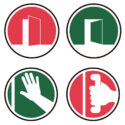
Rhonda Scharf details her top tips for combatting imposter syndrome
When I was younger, I applied to be the executive assistant to a senior vice-president (SVP). I didn’t feel qualified, and the position was about an eight-category jump from my current one. I never expected to get the job, but I was hoping that I would interview well, and then when the right job came along, they would think of me.
I got the job. I had worked for the SVP before; my first job after college had been in his office as a receptionist. He knew me, knew my work ethic, and had confidence in me. In fact, he had far more confidence in me than I had in myself. I thought that I wasn’t qualified and that the jump was too big. He felt I was qualified and that I could easily do the job. He saw in me ability and potential. I saw something quite different. I was petrified and worried that I would turn this opportunity into a disaster. I said yes, but, as you can imagine, I questioned why I accepted this job for a long time.
Feeling like an imposter
For the next several months, I kept expecting to be fired. I kept expecting the other EAs to challenge me about why I had gotten the job. I thought they were talking behind my back about my lack of qualifications and inability to do the job. I felt that everyone knew I was flying by the seat of my pants and I wasn’t certain they were wrong.
I was suffering from classic imposter syndrome.
Have you ever questioned why you got the job you have? Have you ever explained to others that you had “been lucky”? Do you sometimes feel that it’s just a matter of time until everyone finds out, and you’re fired right out of that job you “don’t deserve”?
Nearly 70 percent of people will experience imposter syndrome (also known as imposter phenomenon and fraud syndrome) at least once in their life, according to Wikipedia. They define it as “a psychological pattern in which an individual doubts their skills, talents, or accomplishments and has a persistent internalized fear of being exposed as a fraud.”
You are not alone
I knew I wasn’t alone in feeling like a fraud, yet I had no idea how widespread imposter syndrome was when I started speaking about it in my workshops. Admins I spoke with who identified themselves as feeling like imposters at work were also surprised that so many of us could relate.
Maya Angelou was an American poet, memoirist, and civil rights activist and was one of my favourite authors. She said, “I have written many books and each time I think ‘uh-oh, they’re going to find out now. I’ve run a game on everybody, and they’re going to find me out.’” Comedian Tina Fey talks about imposter syndrome in her book “Bossy Pants,” and Barbra Streisand is famous for having avoided performing live for more than three decades because she worried she would disappoint her audiences.
If people as successful as Maya, Tina, and Barbra can feel like a fraud, I shouldn’t feel so alone. Neither should you, so in order to help us all, I’ve come up with my three tips and how to cope with imposter syndrome.
Top Tips for Combatting Impostor Syndrome
1. Recognize that the opposite of imposter is not entitled
For whatever reason, when something good happens to many of us, we don’t want to give the illusion that we are entitled, so we downplay it instead. Humility and worthiness have nothing to do with accepting what we have worked hard for and earned. We don’t have to feel like a fraud also to be gracious, open, or humble. When someone says, “Good for you!” resist the urge to discount what you have achieved. Don’t tell them you got lucky, or the stars aligned. It is okay to say, “Thank you. I worked very hard for it.”
When I received the promotion I told you about, I couldn’t have said that I worked very hard for it and believe myself, however, I could say “Thank you. I work really hard in everything I do, and I’ll work very hard in this role too.” That is the truth as I do work very hard in everything I do, and I had every intention in working very hard in my role as EA as well. It didn’t discount the belief my executive had in me, and it didn’t discount that I was intending on working hard to earn my respect in the role either. I wasn’t entitled. I was lacking confidence, but not ability.
2. Strive to end perfectionism
Many of us who suffer from imposter syndrome are high achievers. We set extremely high standards for ourselves. Perfectionism feeds into imposter syndrome because we often demand of ourselves some “perfect” outcome that is impossible and unrealistic. Ask yourself, “When is good enough – good enough?” Give yourself permission to be great and not always perfect.
I am a perfectionist, and my need to be excellent at what I do can become counterproductive and make me feel like a fraud at times. Being perfect isn’t a reasonable expectation for any of us. When I deliver a workshop, I want it to be the best you’ve ever attended. Is that reasonable? I can be the best for some, but it isn’t reasonable for me to the best for everyone I meet. When I read the feedback forms, and I’m rated “average,” it hurts me. I feel guilty for thinking I want to be the best when I’m just average to some.
Do you do that during your performance evaluations? Do you hear from your executive that you are “average” at your job and wonder, “why bother if I’m only going to be average?” Then we end up in a downward spiral, doubting our ability to do the job at all. By expecting to be perfect, we are feeding into imposter syndrome. Take the pressure off that need to be perfect or the best at everything. It is okay to be good at some things and really good at others. We don’t have to be perfect at everything we do. We can’t be perfect at everything we do; we need to get rid of that expectation altogether.
3. Keep a brag file
I know that this isn’t a new concept for most admins, and for those of us who are parents, we probably kept one for our children. It’s a good idea to track and measure our success. Keep track of those things you did well, so you can’t tell yourself it was a fluke or an accident because you know how hard you worked for it. Sort through it a few times a year to remind yourself that you are not an imposter but instead very qualified to do what it is that you do.
When I take on a task that causes me to doubt myself, I need to remind myself that I have been successful before at new things. I can look at my previous successes and be confident that I will be prepared for whatever it is I have taken on. I can look at the times when I wasn’t as successful as I would like and ask myself what I could have done differently. When I look back at my track record, I realize that I (and you) are successful more often than unsuccessful. I need to look at those successes to know that I can do whatever it is I’m feeling unsure about. Let’s be honest, we trust ourselves more than anyone else. Trust your track record to be successful.
The Lifelong Challenge
Getting rid of imposter syndrome is a lifelong challenge for many of us. I see where I trip up, and I see how I compensate. I happen to be one of those people who gathers every set of letters I can earn to prove that I’m not a fluke. I’ve earned the four highest speaking designations in the world. Do I need them? No. Does it help me get hired? I doubt it. I get hired because of what I’ve done in the past. But I still am goal-oriented and I like all those letters behind my name. If I’m honest, it reminds me that I’m not a fluke, that I am qualified, and that I can do this! But I also recognize that I fall victim to imposter syndrome and if that’s something I need to help me combat it, I’m fine with that.
Remind yourself that you have worked hard to get where you are and that it wasn’t just luck. Stop expecting yourself to be perfect at everything and remind yourself how successful you’ve been in the past. You are capable. You are worthy. You will be successful.
Don’t let imposter syndrome dominate your thinking. Don’t let it cause anxiety, fear, or self-doubt. Don’t let it hold you back from being the amazing administrative professional you are. You’re in your position because you’ve earned it. Be proud of your accomplishments.












